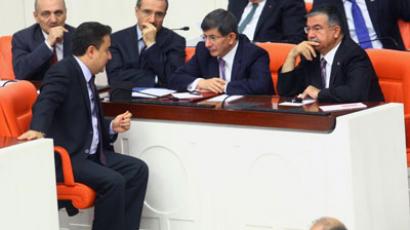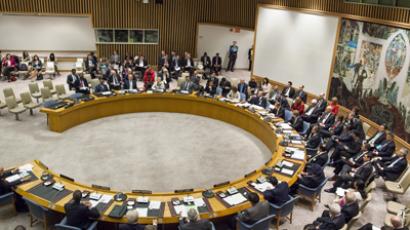Turkish F16s intercept Syrian civilian flight from Moscow to Damascus (VIDEO)
Turkish F-16 fighter jets forced a Syrian Air passenger plane to land in Ankara over suspicions that it was carrying "non-civilian" cargo. The Damascus-bound plane, en route from Moscow, has departed after a nine-hour inspection.
The Airbus A-320, carrying around 30 passengers, was forced to land in Ankara’s international airport at 5:15 pm local time (3:15 pm GMT).The aircraft, which belongs to Syrian Air, was intercepted as it entered Turkish airspace on its way from Moscow by F-16 jets and forced to land at the capital's Esenboga Airport. The Turkish authorities said that it detained the plane on the basis they suspected it to be carrying "certain equipment in breach of civil aviation rules."The Turkish authorities were interested in some spare parts a businessman had purchased in Russia and was bringing to Syria, Fatima al-Saman, a passenger, told RT. She said that as far as she could tell, they were clearly not weapons.“They started unloading some packages. They opened them, took pictures. There were many people. We all saw what was in there. There were no weapons. It was clear ever to the untrained eye!”she said.Turkish Foreign Minister Ahmet Davutoglu claimed that the plane and passengers were free to go after the initial search, but they had to spend several additional hours grounded as Turkish officials completed a “paperwork routine.” The plane’s crew and passengers told RT that the security units surrounding the plane were attempting to force the pilot and several of the crew to sign papers fraudulently describing the incident as an emergency landing. The Turkish authorities reportedly beat members of the crew who refused to sign the documents.Al-Saman added that the search involved only luggage, and the passengers were mainly ignored by the Turkish forces. Russian diplomats who arrived at the airport were not allowed access to the passengers in violation of the 1963 Vienna Convention on Consular Relations.“We are troubled that the lives of the passengers aboard the plane, including 17 Russian citizens were put at risk by this inappropriate act. Turkey did not inform Russia that Russian citizens were among those detained on the plane. We found this out through the press,” Russian Foreign Ministry spokesperson Aleksandr Lukashevich said.The Turkish media speculated that the plane had been diverted on suspicions that it was transporting heavy weaponry. Later reports suggested that Turkey had seized military communications equipment and missile components. However, so far there have been no official confirmations of the contents of the cargo.Ankara granted the Syrian plane a departure clearance, after Turkish security confiscated its “suspicious” cargo, said Turkish Foreign Minister Ahmet Davutoglu. The plane eventually departed Esenboga airport in Turkey at 2:30am local time and, after its nine-hour detour, arrived in Damascus an hour later at 12:30 GMT.None of the passengers have commented on the incident since landing in Syria, and attempts to contact their cell phones have been unsuccessful. The director of Syria's civil aviation agency told RT that the interception of the civilian plane and the search of its cargo compartment were a breach of the Convention on International Civil Aviation. She added that Turkey’s actions had endangered the lives of those on board the passenger plane.Turkey is determined to stop any transfer of weapons to the Syrian government through its airspace, Davutoglu said Wednesday. The FM added that Turkey has every right under international law to investigate any civilian plane suspected to be carrying military equipment.Meanwhile, Ankara has banned Turkish passenger flights from entering Syrian airspace."All civilian flights in Syrian airspace have been stopped, since it is no longer safe," the ministry added in their Wednesday statement. A Turkish plane that had already taken off for Saudi Arabia made a detour and landed at the Adana airport, reports Today's Zaman newspaper. Tensions between Turkey and Syria have escalated since a Syrian shell killed five civilians in the border town of Akcakale last week.
Arms wrangle
Western powers have repeatedly accused various countries of smuggling weapons into Syria and breaching an arms embargo imposed on Damascus by the EU.On Wednesday, Iraq publicly denied allegations of providing its territory for use in the transport of arms from Iran to Syria. Iraqi Prime Minister Nouri al-Maliki said Baghdad is performing random checks of aircraft from Iran to Syria and nothing has been found so far.In March, the US and the UK lashed out at Iran, saying the country was supplying weapons to forces loyal to Syrian President Bashar al-Assad. Damascus and Tehran immediately denied the allegations.Russia has also been a suspect in the case. In June, a Russian cargo ship transporting three MI-25 helicopters, sailing from the Baltic port of Kaliningrad to Syria, was stopped off the coast of Scotland and forced to turn back after the vessel's insurer revoked its coverage.Western media were quick to speculate about arms supplies from Russia to Syria, but Russia's Foreign Minister Sergey Lavrov explained that the helicopters had been repaired by Russia for Syria under a 2008 agreement.The Syrian rebels, on the other hand, are known to use financial backing from supporters including Saudi Arabia and Qatar to buy weapons on the black market. The rebels' supporters are also suspected of supplying weapons to them directly. This week, a BBC report showed footage of a crate with a label marking it as products manufactured by a Ukrainian firm and shipped to the Saudi military.The US said it supports Syrian rebel forces with materiel including communication equipment, but stopped short of delivering arms due to the fear that they would end up in the hands of forces linked to al-Qaeda.Turkey itself hosts a number of refugee camps for Syrians. Some media reports say the camps are used by the rebels for recruiting, receiving medical help and getting rest before going back into Syria to fight government forces.There are also reports that Turkish officers lend their tactical skills to Syria's armed opposition. The rebels have too few trained officers among their ranks, and lack a proper military structure to fight on par with a regular army. Turkish generals are allegedly trying to close the gap, providing their clients with intelligence, communications and combat plans.Turkey, once an ally of Syria, is now a vocal critic of the Assad government, while Damascus in not pulling any punches in condemning Turkish involvement in the Syrian conflict. In June the confrontation resulted in the deaths of two Turkish pilots. Their reconnaissance jet strayed into Syrian airspace and was shot down by air defense forces. The incident provoked a major scandal, with Turkey threatening to invoke its NATO membership and request that the alliance defend it.Turkish artilleries have been busy recently shelling Syrian territory in response to daily mortar shots fired from across the border. Damascus offered its regrets after the second such incident, which killed four Turkish civilians. However, some Turkish opposition media reports blamed the mortar shots on the rebel forces, which ironically received the weapons from Turkey. Some observers say the continuing crossfire may be a rebel attempt to provoke a shooting war between Turkey and Syria.
Preliminary passenger list:
Ryad HejaziShatia MariaSvetlana MerkouroveManada Shafaa (with a child)Talmasani/Laith (child)Joukhadar MajdiAlkhadgkhame SamirToptchan OlgaKourea SamirBostani MohamadHamideh SaidAlsaman Fatima (with 3 children)Alsaman Liin (child)Alsaman Yulia (child)Alsaman Mazhid (child)Saman BaselEid SamehFarawati FadiSaleh YazanSafar BahaaaldinTarshakhani AlladinAbozarad MohamadBakir NartkhHadri Ammar














